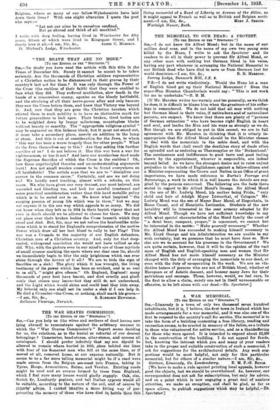"THE BRAVE THAT ARE NO MORE."
[To THE EDP/OR OF THE " SPECTATOR.")
Sna—No doubt you have read the article with this title in the Times of December 6th. Surely it cannot be meant to be taken seriously. Are the thousands of Christian soldiers representative of a Christian nation to be dishonoured in their graves by their country's last act for them ? It was only through the Power of the Cross (the emblem of their faith) that they were enabled to face what they did. They suffered mutilation, slow death in the bands of a remorseless enemy, agonies on the bloody battlefield, and the straining of all their nerve-power after and only because they Saw the Cross before them, and knew that Victory was beyond it. And, now that they are gone the Christian heroism which stirred them to such nobility is to have no distinctive mark for future generations to look upon. Their broken, tired bodies are to be weighted down by lumpy milestones, meaningless blocks without beauty or sanctity. The " appropriate religious symbol" may be engraved on this hideous block, but it must not stand out, it must take a secondary place, merely an addition to the lump of stone. And this is cut of consideration for the Jews, to whom " this war has been a worse tragedy than for other people." What do the Jews themselves say to this ? Are they asking this further slerifiee of us I do not believe it. Has this war been a war for righteousness, or has it not ? And have our numberless dead made the Supreme Sacrifice of which the Cross is the emblem ? Oh, how these unprincipled theories and unamderetanding arguments hurt! Are not small wooden crosses to be found everywhere on all battlefields? The article save that we are to "discipline our sorrow in the common cause." Certainly, and are we not doing ea ? We hardly need teaching, almost with a rebuke, on this score. We who have given our very dearest, our most beloved, are wounded and bleeding too, and look for careful treatment and some practical consideration rather than this hard metallic policy which is to be meted out to us. We know what inspired "the surging passion of young life which was in them," but we may not express it in the one way which appeals to 60 many. We did not know when they left us in 1914 in their boyish vigour that not even in death should we be allowed to choose for them. We may not place over their broken bodies the Cross beneath which they stood and died. But, Sir, may we not refuse the heathenlike mile- stone which is to stand for England's comprehension of the motive Power which drew all her best blood to rally to her Flag? This war was a Crusade to the majority of our English defenders, Christian men of a Christian country. And, only for that deep- rooted, widespread conviction she would not have rallied as she did. Why, with the picture ever in our mind's eye of those myriade of small crosses marking the spots where our dear ones lie, should we immediately begin to blur the only brightness which can ever shine through the horror of it all? We are to hide the sign of Sacrifice on a slab' The glory which it has wrought, the living testimony of its power which has been so evident, and is so real to us sti'l, "might give offence." Oh England, England' many thousands of your beet have learnt, and died cruelly and glort- ously that others may learn—but they still do not understand, and the Light which would shine and could heal they hide away. My beloved only son shall not lie under a elab if I can help it. He died Crusader—the Crowe or nothing, shall mark his grave.—






































 Previous page
Previous page